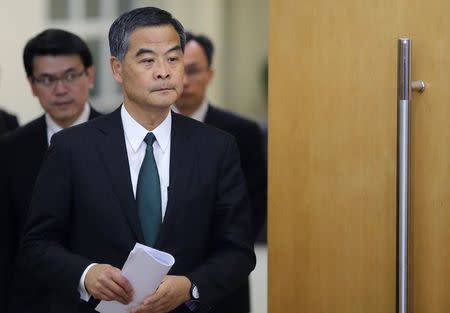Hong Kong chief urges residents to go easy on mainland hordes

By Clare Jim and Paul Carsten HONG KONG/BEIJING (Reuters) - Hong Kong must consider the rights of mainland Chinese as well as the economic impact of any changes to its visitor policy, Chief Executive Leung Chun-ying said on Friday, amid mounting anger in the former British colony against hordes of mainland shoppers. Hong Kong people fume that mainland tourists crowd them out of malls and buy up all available supplies of daily necessities such as diapers and milk powder. Police have used pepper spray to break up confrontations as locals have cursed mainlanders, shouting at them to go back to China. Leung said last week that Hong Kong may need to restrict the number of mainland Chinese coming into the city and promised to raise the issue while he was in Beijing during China's annual parliamentary meeting. He appeared to soften that stance in Beijing on Friday. "We have to balance mainland residents' need to travel to Hong Kong and their rights under the existing policy with the livelihood of Hong Kong people," he said on the sidelines of a meeting of the National People's Congress. "Also, any adjustments in the policy cannot result in a significant drop in tourist numbers and hence affect the overall economy of Hong Kong and employment." Over 40 million mainland tourists visited Hong Kong last year, vastly outnumbering the city's population of 7.2 million. At the same time, retail sales have slipped to their lowest levels since the SARS scare in 2003 and mainland visitors during this year's Lunar New Year holiday fell for the first time in 20 years. Anger toward mainland Chinese in Hong Kong is longstanding but has come to a head as frustrations mount over Beijing's unwillingness to negotiate on political reforms. A special administrative region of China, Hong Kong was returned to Chinese Communist Party rule in 1997 under a "one country, two systems" formula that gives it separate laws and an independent judiciary but leaves Beijing with ultimate authority. Student-led pro-democracy protests shut down parts of the city for two and a half months last year as activists called for open nominations in the city's next chief executive election in 2017. Leung reiterated on Friday that there was no room for negotiation. Beijing will allow a vote, but only between pre-screened candidates. "There is no question of the National People's Congress withdrawing the decision that they made on Aug. 31. There is no question of restarting the process," Leung said. "Everyone at home has to be realistic about this." (Reporting Clare Jim and Donny Kwok in HONG KONG and Paul Carsten in BEIJING; Writing by Clare Baldwin; Editing by Nick Macfie)

